一般过去时 VS 过去进行时
- 格式:ppt
- 大小:249.00 KB
- 文档页数:11
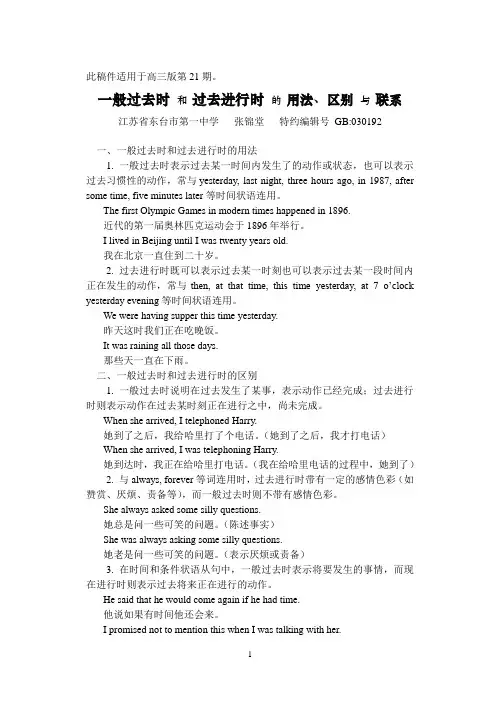
此稿件适用于高三版第21期。
一般过去时和过去进行时的用法、区别与联系江苏省东台市第一中学张锦堂特约编辑号GB:030192一、一般过去时和过去进行时的用法1. 一般过去时表示过去某一时间内发生了的动作或状态,也可以表示过去习惯性的动作,常与yesterday, last night, three hours ago, in 1987, after some time, five minutes later等时间状语连用。
The first Olympic Games in modern times happened in 1896.近代的第一届奥林匹克运动会于1896年举行。
I lived in Beijing until I was twenty years old.我在北京一直住到二十岁。
2. 过去进行时既可以表示过去某一时刻也可以表示过去某一段时间内正在发生的动作,常与then, at that time, this time yesterday, at 7 o’clock yesterday evening等时间状语连用。
We were having supper this time yesterday.昨天这时我们正在吃晚饭。
It was raining all those days.那些天一直在下雨。
二、一般过去时和过去进行时的区别1. 一般过去时说明在过去发生了某事,表示动作已经完成;过去进行时则表示动作在过去某时刻正在进行之中,尚未完成。
When she arrived, I telephoned Harry.她到了之后,我给哈里打了个电话。
(她到了之后,我才打电话)When she arrived, I was telephoning Harry.她到达时,我正在给哈里打电话。
(我在给哈里电话的过程中,她到了)2. 与always, forever等词连用时,过去进行时带有一定的感情色彩(如赞赏、厌烦、责备等),而一般过去时则不带有感情色彩。
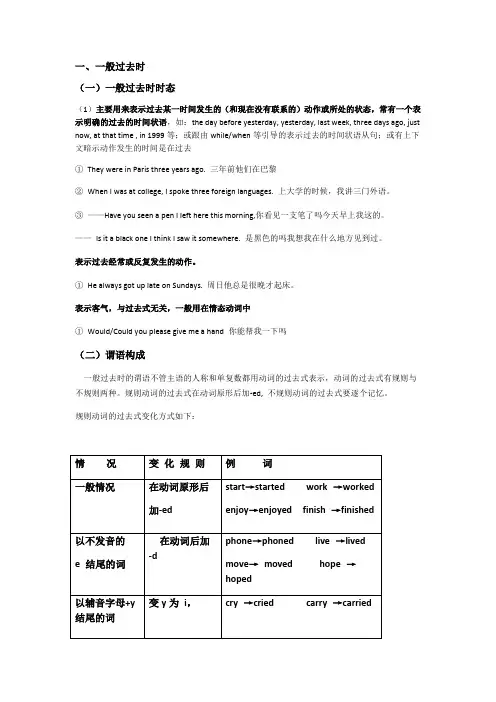
一、一般过去时(一)一般过去时时态(1)主要用来表示过去某一时间发生的(和现在没有联系的)动作或所处的状态,常有一个表示明确的过去的时间状语,如:the day before yesterday, yesterday, last week, three days ago, just now, at that time , in 1999等;或跟由while/when等引导的表示过去的时间状语从句;或有上下文暗示动作发生的时间是在过去①They were in Paris three years ago. 三年前他们在巴黎②When I was at college, I spoke three foreign languages. 上大学的时候,我讲三门外语。
③——Have you seen a pen I left here this morning,你看见一支笔了吗今天早上我这的。
——Is it a black one I think I saw it somewhere. 是黑色的吗我想我在什么地方见到过。
表示过去经常或反复发生的动作。
①He always got up late on Sundays. 周日他总是很晚才起床。
表示客气,与过去式无关,一般用在情态动词中①Would/Could you please give me a hand 你能帮我一下吗(二)谓语构成一般过去时的谓语不管主语的人称和单复数都用动词的过去式表示,动词的过去式有规则与不规则两种。
规则动词的过去式在动词原形后加-ed, 不规则动词的过去式要逐个记忆。
规则动词的过去式变化方式如下:不规则动词的过去式(举例)begin →began go →went see →saw do →did get →got come →came leave →left am →was are →were give →gave have →had think →thought一般过去时的否定式和疑问式(1)实义动词的一般过去时的否定式和疑问式要用助动词did帮助构成。

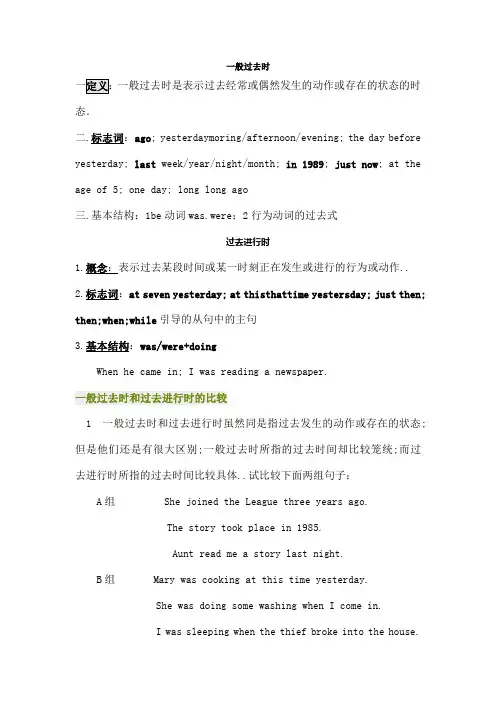
一般过去时一般过去时是表示过去经常或偶然发生的动作或存在的状态的时态.二.标志词:ago; yesterdaymoring/afternoon/evening; the day before yesterday; last week/year/night/month; in 1989; just now; at the age of 5; one day; long long ago三.基本结构:1be动词was.were;2行为动词的过去式过去进行时1.概念:表示过去某段时间或某一时刻正在发生或进行的行为或动作..2.标志词:at seven yesterday; at thisthattime yestersday; just then; then;when;while引导的从句中的主句3.基本结构:was/were+doingWhen he came in; I was reading a newspaper.一般过去时和过去进行时的比较1 一般过去时和过去进行时虽然同是指过去发生的动作或存在的状态;但是他们还是有很大区别;一般过去时所指的过去时间却比较笼统;而过去进行时所指的过去时间比较具体..试比较下面两组句子:A组 She joined the League three years ago.The story took place in 1985.Aunt read me a story last night.B组 Mary was cooking at this time yesterday.She was doing some washing when I come in.I was sleeping when the thief broke into the house.A组中的three years ago、in 1985、last night 所指的过去时间均较为笼统;因此必须采用一般过去时..而B组中的at this time yesterday、 when I came in、 when the thief broke into the house 所指的过去时间均较为具体;因此必须采用过去进行时..2 一般过去时和过去进行时;除了他们所指的时间有差别之外;还可以通过他们动作的性质来加以区别..一般过去时表示在过去某个时间发生的动作或存在的状态;也表示过去经常或反复发生的动作..它强调的是动作的“发生”或状态的“存在”..过去进行时表示在过去某一时刻或在过去某一段时间内正在进行的动作..它强调的是动作的“正在进行”..试比较下面两组句子:C组Did he watch TV last nightI got up at five yesterday.I studied in that class last year.D组 Mum was doing some washing yesterday evening.We were cleaning the classroom this time yesterday.The teacher was talking to some parents when I saw her.C组中的“看电视”、“起床”、“学习”都是属于过去某一时候动作的“发生”或状态的“存在”;所以必须采用一般过去时..而D组中的“在洗衣服”、“在打扫教室”、“正在谈话”都是指过去某一时刻动作“正在进行”;所以必须采用过去进行时..3 有时;同是发生于过去某一个时候的某一个动作;既可采用一般过去时;也可采用过去进行时;但其语意却不尽相同;而且还有着很大的区别..试比较下列几对句子:Jack wrote a letter to his parents last night.杰克昨晚给他的父母写了封信..信写完了Jack was writing a letter to his parents last night.杰克昨晚一直在给他的父母写信..信不一定写完They planted trees last Sunday. 他们上星期天植树..树植完They were planting trees last Sunday. 他们上星期天一直在植树..树不一植完注意:一般过去时的谓语动词;即可用延续性动词;也可用非延续性动词;而过去进行时的谓语动词只能用延续性动词..如A组句型中的;“join”、“take place”为非延续性动词;“read”为延续性动词;B组句型中的“cook”、“do”与“sleep”均为延续性动词..练习题1. I ___________ have an exciting party last weekend.2. --_____________she _____________play her guitar吉他 yesterday --No; she _____________.3.—What ___________Tom __________ do on Saturday evening--He _________watch TV and __________read an interesting book.4. They all ____________go to the mountains yesterday morning.5. She _____________not visit her aunt last weekend. She ____________stay at home and ___________do some cleaning.6. I cleaned my classroom ___________.A with three hoursB three hours agoC inthree hours7. The reporter said that the UFO ___ east to west when he sawit.A. was travelingB. traveledC. had been travelingD. was totravel8 . ___________ He did some reading at home.A What does your father do yesterday eveningB What does yourbrother do in the schoolC What did your brother do over the weekend9. What did you do ________ I went to the movies.A next morning Blast weekend C in the weekend10.. “What’s the matter; Ali You look sad.”“Oh; nothing much. As a matter of fact; I ___ of my friendsA. just thoughtB. have just been thinkingC. was just thinking11.My brother ___ while he ___ his bicycle and hurt himself.A. fell; was ridingB. fell; were ridingC. had fallen; rode12. Tom ___ into the house when no one ___.A. slipped was looking B was slipping; looked C slipped; hadlooked13.The last time I __ Jane she ___ cotton in the fields.A. saw; was pickingB. saw; pickedC. had seen; picked14.I don 't think Jim saw me; he ___ into space.A. just staredB. was just staringC. has just stared15.I first met Lisa three years ago. She ___ at a radio shop at the time.A. has workedB. was workingC. had been workingD. had worked16;John_______work all day yesterday.17;He _______walk home when the rian_______begin.18—What______you _______do at ten o'clock yesterday﹖—I_______studay in class.19.When Harry _______have breakfast Lily _______telephone him.20.When I ________ go to school this morning I ______ see a car running into a bus.。
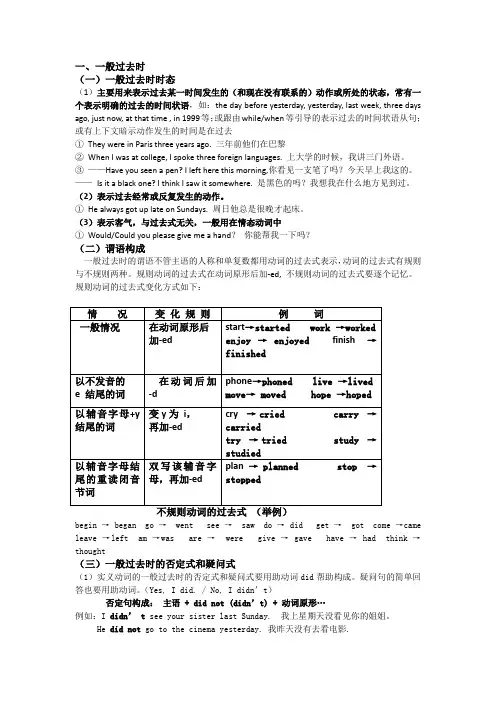
一、一般过去时(一)一般过去时时态(1)主要用来表示过去某一时间发生的(和现在没有联系的)动作或所处的状态,常有一个表示明确的过去的时间状语,如:the day before yesterday, yesterday, last week, three days ago, just now, at that time , in 1999等;或跟由while/when等引导的表示过去的时间状语从句;或有上下文暗示动作发生的时间是在过去①They were in Paris three years ago. 三年前他们在巴黎②When I was at college, I spoke three foreign languages. 上大学的时候,我讲三门外语。
③——Have you seen a pen? I left here this morning,你看见一支笔了吗?今天早上我这的。
——Is it a black one? I think I saw it somewhere. 是黑色的吗?我想我在什么地方见到过。
(2)表示过去经常或反复发生的动作。
①He always got up late on Sundays. 周日他总是很晚才起床。
(3)表示客气,与过去式无关,一般用在情态动词中①Would/Could you please give me a hand?你能帮我一下吗?(二)谓语构成一般过去时的谓语不管主语的人称和单复数都用动词的过去式表示,动词的过去式有规则与不规则两种。
规则动词的过去式在动词原形后加-ed, 不规则动词的过去式要逐个记忆。
规则动词的过去式变化方式如下:begin → began go → went see → saw do → did get → got come →came leave →left am →was are → were give → gave have → had think →thought(三)一般过去时的否定式和疑问式(1)实义动词的一般过去时的否定式和疑问式要用助动词did帮助构成。
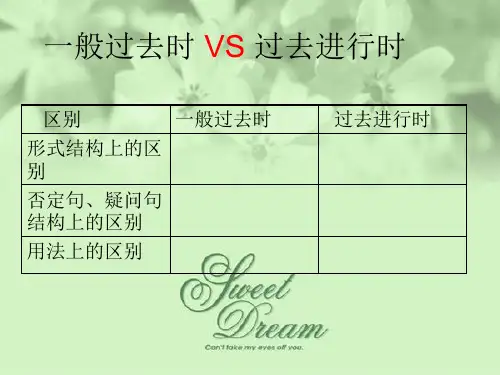
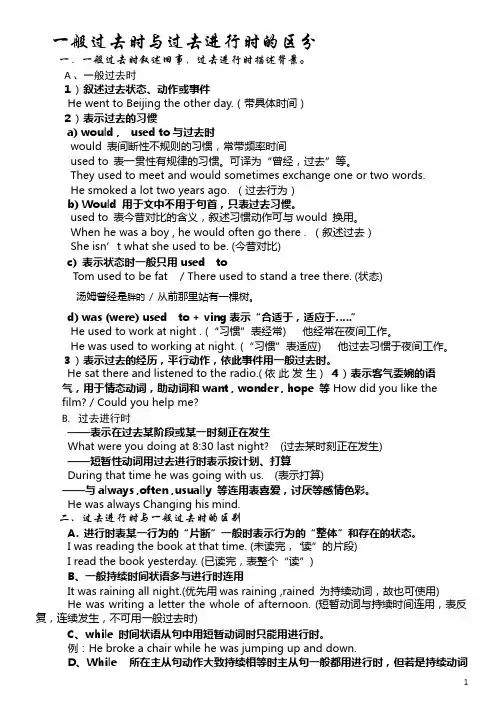
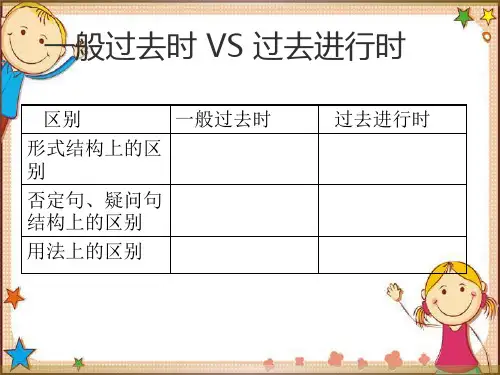
![[译林版]5B一般过去时与过去进行时区别及练习](https://uimg.taocdn.com/58930e15905f804d2b160b4e767f5acfa1c783de.webp)
[译林版]5B一般过去时与过去进行时区别及练习一般过去时和过去进行时是英语语法中的两种过去时态,它们有着不同的用法和区别。
本文将详细介绍这两种时态的特点,并提供相关练。
一般过去时 (Simple Past Tense)一般过去时用于表示过去发生的动作或状态。
它通常与表示过去的时间状语连用,例如"yesterday"(昨天)、"last week"(上周)等。
结构一般过去时的肯定句结构如下:- 主语 + 动词过去式 + 其他成分例如:- I played basketball yesterday.一般过去时的否定句结构如下:- 主语 + did not + 动词原形 + 其他成分例如:- She did not eat breakfast this morning. 一般过去时的疑问句结构如下:- Did + 主语 + 动词原形 + 其他成分? 例如:- Did you watch a movie last night?用法一般过去时主要用于以下情况:- 表示过去某个具体的时间或时间段发生的动作或状态。
- 表示过去经常性、惯性的动作或状态。
注意:一般过去时与现在无关,只用于过去事件的描述。
过去进行时 (Past Continuous Tense)过去进行时用于表示过去某一时刻正在进行的动作。
它通常与表示过去的时间状语连用,例如"at that moment"(那时候)、"while"(当...的时候)等。
结构过去进行时的肯定句结构如下:- 主语 + was/were + 动词-ing形式 + 其他成分例如:- He was playing soccer when it started raining.过去进行时的否定句结构如下:- 主语 + was/were not + 动词-ing形式 + 其他成分例如:- They were not studying when the phone rang.过去进行时的疑问句结构如下:- Was/Were + 主语 + 动词-ing形式 + 其他成分? 例如:- Were you sleeping when I called you?用法过去进行时主要用于以下情况:- 描述过去某一时刻正在进行或发生的动作。
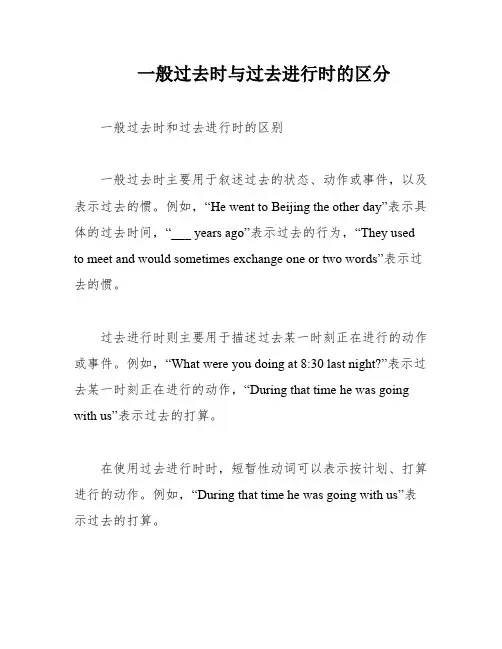
一般过去时与过去进行时的区分一般过去时和过去进行时的区别一般过去时主要用于叙述过去的状态、动作或事件,以及表示过去的惯。
例如,“He went to Beijing the other day”表示具体的过去时间,“___ years ago”表示过去的行为,“They used to meet and would sometimes exchange one or two words”表示过去的惯。
过去进行时则主要用于描述过去某一时刻正在进行的动作或事件。
例如,“What were you doing at 8:30 last night?”表示过去某一时刻正在进行的动作,“During that time he was going with us”表示过去的打算。
在使用过去进行时时,短暂性动词可以表示按计划、打算进行的动作。
例如,“During that time he was going with us”表示过去的打算。
值得注意的是,过去进行时一般不用于叙述旧事,而是用于描述背景。
He always changed his mind。
indicating his indecisiveness.There is a difference een the present continuous tense and the simple past tense。
The present continuous tense represents a "fragment" of an n。
while the simple past ___ n or state。
For example。
"I was reading the book at that time" indicates that the person had not finished reading the book。
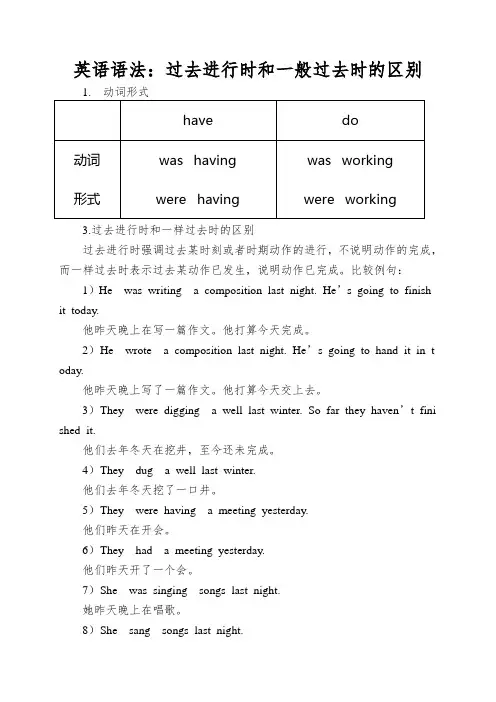
英语语法:过去进行时和一般过去时的区别3.过去进行时和一样过去时的区别过去进行时强调过去某时刻或者时期动作的进行,不说明动作的完成,而一样过去时表示过去某动作已发生,说明动作已完成。
比较例句:1)He was writing a composition last night. He’s going to finish it today.他昨天晚上在写一篇作文。
他打算今天完成。
2)He wrote a composition last night. He’s going to hand it in t oday.他昨天晚上写了一篇作文。
他打算今天交上去。
3)They were digging a well last winter. So far they haven’t fini shed it.他们去年冬天在挖井,至今还未完成。
4)They dug a well last winter.他们去年冬天挖了一口井。
5)They were having a meeting yesterday.他们昨天在开会。
6)They had a meeting yesterday.他们昨天开了一个会。
7)She was singing songs last night.她昨天晚上在唱歌。
8)She sang songs last night.她昨天晚上唱了几首歌。
一、选择填空。
1.——___ to see Mr. Mandy. My appointment is a 10 o’clock.——You are on time for your appointment.A.I’ve comeB. I’d comeC.I comeD. I came2.The head nurse has to walk around the wards, and makes sure that the nurses___ their jobs.A.would doB. had doneC.are doingD. were doing参考答案:1-2: AC二、分析句子的语法结构,并译成中文。
一般过去时(二).标志词:ago, yesterday(moring/afternoon/evening), the day before yesterday, last week/year/night/month, in 1989,just now, at the age of 5, one day, long long ago(三).基本结构:1be动词();2行为动词的过去式过去进行时1.概念:表示过去某段时间或某一时刻正在发生或进行的行为或动作。
2.标志词:at seven yesterday, at this(that)time yestersday, just then, then,when,while引导的从句中的主句3.基本结构:was/were+doingWhen he came in, I was reading a newspaper.一般过去时和过去进行时的比较1 一般过去时和过去进行时虽然同是指过去发生的动作或存在的状态,但是他们还是有很大区别,一般过去时所指的过去时间却比较笼统,而过去进行时所指的过去时间比较具体。
试比较下面两组句子:A组 She joined the League three years ago.The story took place in 1985.Aunt read me a story last night.B组 Mary was cooking at this time yesterday.She was doing some washing when I come in.I was sleeping when the thief broke into the house.A组中的three years ago、in 1985、last night 所指的过去时间均较为笼统,因此必须采用一般过去时。
而B组中的at this time yesterday、 when I came in、 when the thief broke into the house 所指的过去时间均较为具体,因此必须采用过去进行时。
过去进行时与一般过去时都强调过去发生的事进行时强调过程,不一定完成过去时强调事件,一定完成p.s.:表示一个动作正在进行时,另一个动作发生了如:He played when I was studying. 过去进行时与一般过去时,两者都表示过去发生的动作,但过去进行时表示在过去某一特定的时间点或时间段正在进行的动作,而一般过去时表示在过去时间完成的动作。
例如:I was typing a letter last night. 昨晚我在打一封信.(可能没打完)I typed some letters last night. 我昨晚打了一些信.(已经打完)1、一般过去时往往表示某一动作已经完成,而过去进行时却表示动作在持续或未完成。
(延续性动词)She wrote a letter to her friend last night. 她昨晚给朋友写了封信。
(信写完了)She was writing a letter to her friend last night. 她昨晚一直在给朋友写信。
(信不一定写完)2、一般过去时表示只做一次动作,而过去进行时却表示动作反复地进行。
(短暂性动词)She waved to me. 她朝我挥了挥手。
3、句中有a moment ago之类的短语一般用一般过去时。
4、句中有at this time last Sunday,from 8 to 9 yesterday 之类的状语一般用过去进行时。
过去进行时可以用来代替一般过去时,表示更为偶然而非预定的动作:I was talking to Tom the other day.那天我跟汤姆聊天来着。
不用于进行时的动词感官动词:hear,see,notice,feel,taste……表示态度感情的动词:like,love,hate……表心理状态:feel,want,prefer……表占有:own,have,……表存在状态和持续:look,owe,be……练习:一、用动词的适当形式填空。
一般过去时,过去进行时和现在完成时的区别一、一般过去时1.表示在过去时间内发生的动作或存在的状态,常与表示过去的时间状语连用,如:a few minutes ago, yesterday, last month 等,以及以when 等引导的时间状语从句连用。
The thief entered the building a few minutes ago.A big fire destroyed the whole forest last year.The telephone rang, when I was reading the news report.2. 表示过去经常或反复发生的动作,常与时间状语often,used to或would连用,表示“常常,经常”。
She often came to help us.When he was young, he would help his father on the farm.3. 有些情况,发生的时间不很清楚,但实际上是过去发生的应当用过去时态。
It was a pity that you didn’t go to the lecture.I was glad to receive your letter.I didn’t know you were so busy.4. 表示过去习惯的动作。
When she was a young girl, she often went to her grandpa’s.5. 在表示时间或条件等的状语从句中代替过去将来时。
I would tell her the news as soon as she came.二、过去进行时构成:was / were + doing1.表示过去某一时刻或阶段正在发生的动作。
He was playing tennis at five yesterday afternoon.What were you doing at nine last night?At that time, she was working in a lab.In those years we were having a hard time.We were picking cotton when he arrived.2. 表示按计划,安排过去将要发生的动作。
一般过去时(二).标志词:ago, yesterday(moring/afternoon/evening), the day before yesterday, last week/year/night/month, in 1989, just now, at the age of 5, one day, long long ago (三).基本结构:1be动词(was.were);2行为动词的过去式过去进行时1.概念:表示过去某段时间或某一时刻正在发生或进行的行为或动作。
2.标志词:at seven yesterday, at this(that)time yestersday, just then, then,when,while引导的从句中的主句3.基本结构:was/were+doingWhen he came in, I was reading a newspaper.一般过去时和过去进行时的比较1一般过去时和过去进行时虽然同是指过去发生的动作或存在的状态,但是他们还是有很大区别,一般过去时所指的过去时间却比较笼统,而过去进行时所指的过去时间比较具体。
试比较下面两组句子:A组She joined the League three years ago.The story took place in 1985.Aunt read me a story last night.B组Mary was cooking at this time yesterday.She was doing some washing when I come in.I was sleeping when the thief broke into the house.A组中的three years ago、in 1985、last night 所指的过去时间均较为笼统,因此必须采用一般过去时。
而B组中的at this time yesterday、when I came in、when the thief broke into the house 所指的过去时间均较为具体,因此必须采用过去进行时。
一般过去时和过去进行时的语法总结过去时态是英语中用来表示已经发生或已经完成的动作、事件或状态的一种时态。
在过去时态中,一般过去时和过去进行时是两种常用的时态形式。
下面将对一般过去时和过去进行时进行语法总结和概述。
一、一般过去时(Simple Past Tense)的用法一般过去时表示过去发生的一次性或完成的动作、事件、状态,或者过去的习惯性、持续性动作。
1. 表示过去某个时间发生的动作或事件。
例如:- I went to the park yesterday.(我昨天去了公园。
)- He studied English last night.(他昨晚学习了英语。
)2. 表示过去的习惯性动作或状态。
例如:- She played tennis every week.(她每周打网球。
)- We lived in that house for five years.(我们在那所房子里住了五年。
)3. 表示过去的状态或特征。
例如:- It was sunny yesterday.(昨天天晴。
)- He was a doctor when he was young.(他年轻时是个医生。
)4. 与时间状语连用。
一般过去时常与表示过去的时间状语连用,如:yesterday(昨天)、last week(上周)、in 1999(在1999年)、when I was a child(当我还是个孩子时)等。
二、过去进行时(Past Continuous Tense)的用法过去进行时表示过去某个时间正在进行的动作或状态。
1. 表示过去某个时间点正在进行的动作。
例如:- They were playing basketball at 5 p.m. yesterday.(昨天下午5点他们正在打篮球。
)- I was cooking dinner when she called me.(她给我打电话时,我正在做晚饭。
)2. 表示过去的一段时间内正在进行的动作。
一般过去时与过去进行时的区分一.一般过去时叙述旧事,过去进行时描述背景。
A、一般过去时1)叙述过去状态、动作或事件He went to Beijing the other day.(带具体时间)2)表示过去的习惯a) would , used to与过去时would 表间断性不规则的习惯,常带频率时间used to 表一贯性有规律的习惯。
可译为“曾经,过去”等。
They used to meet and would sometimes exchange one or two words.He smoked a lot two years ago. (过去行为)b) Would 用于文中不用于句首,只表过去习惯。
used to 表今昔对比的含义,叙述习惯动作可与would 换用。
When he was a boy , he would often go there . (叙述过去)She isn’t what she used to be. (今昔对比)c) 表示状态时一般只用used toTom used to be fat / There used to stand a tree there. (状态)汤姆曾经是胖的/ 从前那里站有一棵树。
d) was (were) used to + ving表示“合适于,适应于…..”He used to work at night . (“习惯”表经常) 他经常在夜间工作。
He was used to working at night. (“习惯”表适应) 他过去习惯于夜间工作。
3)表示过去的经历,平行动作,依此事件用一般过去时。
He sat there and listened to the radio.(依此发生)4)表示客气委婉的语气,用于情态动词,助动词和want , wonder , hope 等How did you like the film? / Could you help me?B. 过去进行时——表示在过去某阶段或某一时刻正在发生What were you doing at 8:30 last night? (过去某时刻正在发生)——短暂性动词用过去进行时表示按计划、打算During that time he was going with us. (表示打算)——与always ,often ,usually 等连用表喜爱,讨厌等感情色彩。